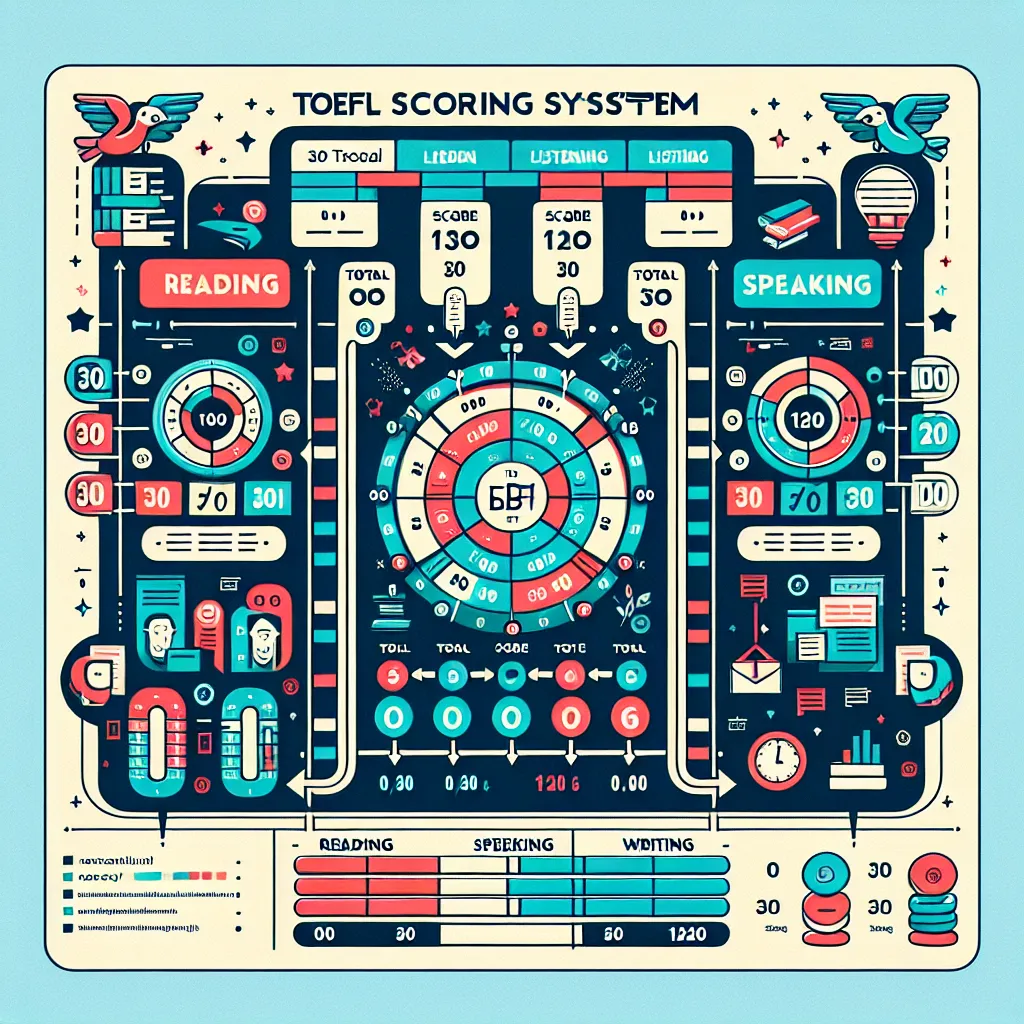Are you preparing for the TOEFL iBT and wondering what score you should aim for? Understanding what constitutes a good TOEFL iBT score is crucial for setting realistic goals and meeting the requirements of your target institutions. In this comprehensive guide, we’ll explore the TOEFL iBT scoring system, analyze what is considered a good score, and provide tips to help you achieve your desired results.
Understanding the TOEFL iBT Scoring System
Before we dive into what makes a good TOEFL iBT score, it’s essential to understand how the test is scored. The TOEFL iBT consists of four sections: Reading, Listening, Speaking, and Writing. Each section is scored on a scale of 0-30, with the total score ranging from 0-120.
 TOEFL iBT Scoring System
TOEFL iBT Scoring System
How Each Section is Scored
- Reading (0-30 points): Measures your ability to understand academic texts.
- Listening (0-30 points): Evaluates your capacity to comprehend spoken English in academic settings.
- Speaking (0-30 points): Assesses your ability to express yourself clearly in English.
- Writing (0-30 points): Tests your ability to write clear, well-structured essays in English.
What is Considered a Good TOEFL iBT Score?
Determining a “good” TOEFL iBT score depends on several factors, including your personal goals, the requirements of the institutions you’re applying to, and your field of study. However, we can provide some general guidelines:
Overall TOEFL iBT Scores
- 100-120: Excellent score (top 10% of test-takers)
- 90-99: Very good score (top 25% of test-takers)
- 80-89: Good score (above average)
- 70-79: Fair score (average)
- Below 70: Below average score
Score Interpretation by Section
-
Reading and Listening:
- 22-30: High
- 15-21: Intermediate
- 0-14: Low
-
Speaking and Writing:
- 26-30: Good
- 18-25: Fair
- 10-17: Limited
- 0-9: Weak
It’s important to note that these are general guidelines, and the definition of a “good” score can vary depending on your specific circumstances.
Factors Affecting What is Considered a Good TOEFL iBT Score
Several factors influence what is considered a good TOEFL iBT score:
-
University Requirements: Different universities and programs have varying TOEFL score requirements. For example:
- Ivy League schools often require scores of 100 or higher.
- Many graduate programs require a minimum score of 80-90.
- Some undergraduate programs may accept scores as low as 70-80.
-
Field of Study: Some fields, such as English Literature or Linguistics, may require higher scores, particularly in the Reading and Writing sections.
-
Scholarship Requirements: Many scholarships have specific TOEFL score requirements, often higher than general admission requirements.
-
Job Market Demands: If you’re taking the TOEFL for employment purposes, industry standards may influence what is considered a good score.
How to Determine Your Target TOEFL iBT Score
To set a realistic and appropriate target score, follow these steps:
-
Research Requirements: Look up the TOEFL requirements for your target universities or programs.
-
Consider Your Field: Investigate if your chosen field of study has specific score expectations.
-
Check Scholarship Criteria: If you’re applying for scholarships, note their TOEFL score requirements.
-
Assess Your Current Level: Take a practice test to gauge your current score and determine how much improvement you need.
-
Set Realistic Goals: Based on your research and current level, set a target score that is challenging but achievable.
 TOEFL iBT Score Goals
TOEFL iBT Score Goals
Tips to Achieve a Good TOEFL iBT Score
Now that you understand what constitutes a good TOEFL iBT score, here are some tips to help you achieve your target:
-
Start Early: Give yourself ample time to prepare, ideally 3-6 months before the test date.
-
Use Official Materials: Practice with official TOEFL iBT prep materials from ETS for the most authentic experience.
-
Focus on Weak Areas: Identify your weaknesses and dedicate extra time to improving those skills.
-
Practice Regularly: Consistent practice is key to improving your English skills and test-taking strategies.
-
Simulate Test Conditions: Take full-length practice tests under timed conditions to build stamina and familiarity with the test format.
-
Improve Your English Skills: Engage with English media (news, podcasts, books) to enhance your overall language proficiency.
-
Seek Feedback: Work with a tutor or join study groups to get feedback on your speaking and writing skills.
-
Learn Test-Taking Strategies: Familiarize yourself with TOEFL-specific strategies for each section to maximize your score.
Conclusion
Understanding what constitutes a good TOEFL iBT score is essential for setting realistic goals and meeting the requirements of your target institutions. While scores of 90 and above are generally considered good, the definition of a “good” score can vary based on your specific circumstances and goals. By researching requirements, assessing your current level, and following a structured preparation plan, you can work towards achieving the TOEFL iBT score you need for success in your academic or professional pursuits.
Remember, the TOEFL iBT is just one aspect of your application. Focus on improving your overall English skills, and your TOEFL score will reflect your progress. Good luck with your TOEFL preparation!
[internal_links]




